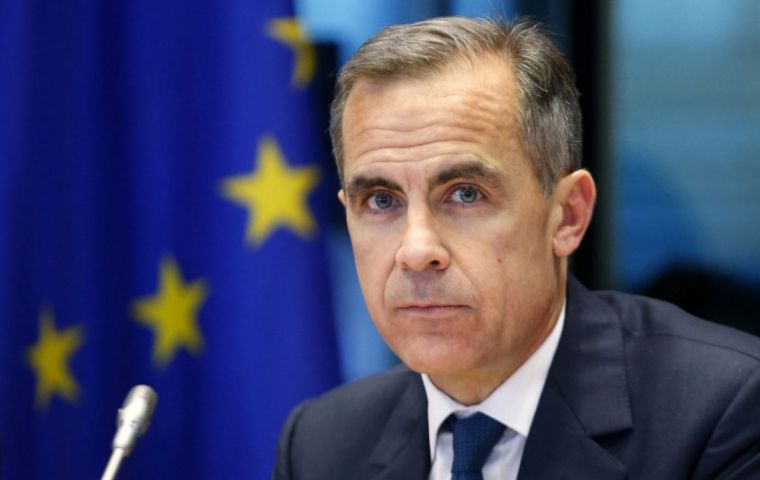MercoPress. South Atlantic News Agency
Brexit uncertainty pounding the economy says Bank of England governor
 ”It's evident...that uncertainties about the eventual relationship (with EU) are weighing on the decisions of some businesses”, said Mark Carney
”It's evident...that uncertainties about the eventual relationship (with EU) are weighing on the decisions of some businesses”, said Mark Carney The governor of the Bank of England has warned that uncertainty over Brexit is already weighing on the economy. Mark Carney's comments came as the Bank voted to hold rates and cut growth forecasts. It edged this year's growth forecast down to 1.7% from its previous forecast of 1.9% made in May and also cut the forecast for 2018 from 1.7% to 1.6%.
Sterling dropped to a nine-month low against the Euro after the downward revision to the growth forecasts. The pound fell about 0.76% to 1.1063 Euros.
Members of the MPC also voted in favor of extending a credit facility to British banks from £100bn to £115bn. The so-called Term Funding Scheme (TFS) runs until February 2018 and has already lent £78bn to banks at close to the bank's base rate of 0.25%.
The bank voted 6-2 to keep interest rates on hold at 0.25%. They have been at that level since August last year. Carney said that business investment was slower than it would have been expected to be because of Brexit.
“It's evident in our discussions across the country with businesses,” he said, “that uncertainties about the eventual relationship are weighing on the decisions of some businesses.”
He said that investment had been weaker than otherwise would have been expected “in a very strong world” and the consequence of that was starting to build: “The speed limit of the economy, if you will, has slowed.”
Governor Carney said the Bank expected business investment to pick up from its current “very subdued” levels, but that it was still below historic rates. He added that Brexit uncertainty was also hitting pay negotiations.
“There is an element of Brexit uncertainty which is affecting the wage bargaining. Some firms, potentially a material number of firms, are less willing to give bigger pay rises given that it is not as clear what their market access is going to be over the course of the next few years,” he said.
Former British Chambers of Commerce director general and co-chairman of pro-Brexit lobby group Leave Means Leave, John Longworth, said he agreed that business confidence is “lower than it ought to be”.
Mr Longworth added that Bank of England was “notoriously bad at forecasting”, so “we should always take it with a pinch of salt”.
Inflation is expected to peak at about 3% in October, as the surge in import prices caused by the post-Brexit-referendum drop in the pound continues to feed through to shop prices.
The bank highlighted that the 18% fall in the pound since November 2015 has been raising the price of imports for the UK, which in turn has been making life more expensive for consumers.
Shoppers may have noticed significant increases in the prices of items such as butter, meat and computer software. The bank also said there had been evidence that spending on cars, home wares and electrical goods had been falling.




Top Comments
Disclaimer & comment rules-

-

-

Read all commentsThis would be Mr Mark “Whoops! I got it wrong about the financial disaster that would follow Brexit.” Carney, would it? The man should give up his dire prognostications and preferably lose his job.
Aug 04th, 2017 - 02:29 pm +1Spot on HJC, but there are Remoaners a plenty to whom his comments will resonate. We'll have to wait and see.....
Aug 04th, 2017 - 03:28 pm +1TA, dream on, we WILL decide our own future.
Aug 05th, 2017 - 10:18 pm 0Commenting for this story is now closed.
If you have a Facebook account, become a fan and comment on our Facebook Page!